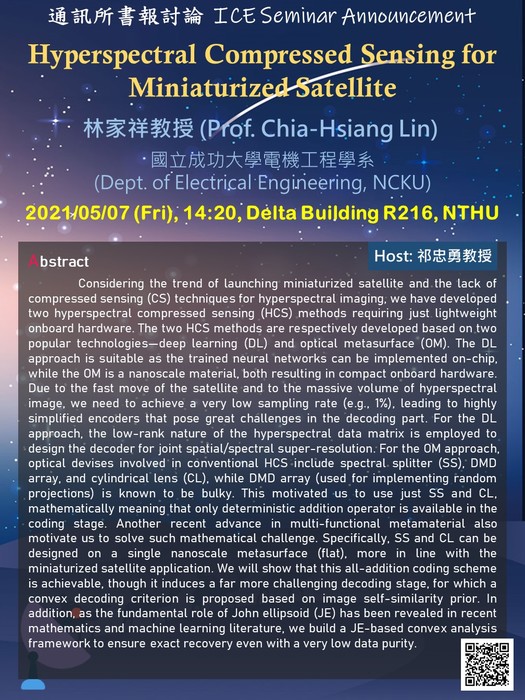


Date&Time :
2021 / 05 / 07 (Fri) 14:20
Location :
Delta Building R216
Speaker :
林家祥教授 (Prof. Chia-Hsiang Lin)
國立成功大學電機工程學系 (Dept. of Electrical Engineering, NCKU)
Topic :
Hyperspectral Compressed Sensing for Miniaturized Satellite
Abstract :
Considering the trend of launching miniaturized satellite and the lack of compressed sensing (CS) techniques for hyperspectral imaging, we have developed two hyperspectral compressed sensing (HCS) methods requiring just lightweight onboard hardware. The two HCS methods are respectively developed based on two popular technologies—deep learning (DL) and optical metasurface (OM). The DL approach is suitable as the trained neural networks can be implemented on-chip, while the OM is a nanoscale material, both resulting in compact onboard hardware. Due to the fast move of the satellite and to the massive volume of hyperspectral image, we need to achieve a very low sampling rate (e.g., 1%), leading to highly simplified encoders that pose great challenges in the decoding part. For the DL approach, the low-rank nature of the hyperspectral data matrix is employed to design the decoder for joint spatial/spectral super-resolution. For the OM approach, optical devises involved in conventional HCS include spectral splitter (SS), DMD array, and cylindrical lens (CL), while DMD array (used for implementing random projections) is known to be bulky. This motivated us to use just SS and CL, mathematically meaning that only deterministic addition operator is available in the coding stage. Another recent advance in multi-functional metamaterial also motivate us to solve such mathematical challenge. Specifically, SS and CL can be designed on a single nanoscale metasurface (flat), more in line with the miniaturized satellite application. We will show that this all-addition coding scheme is achievable, though it induces a far more challenging decoding stage, for which a convex decoding criterion is proposed based on image self-similarity prior. In addition, as the fundamental role of John ellipsoid (JE) has been revealed in recent mathematics and machine learning literature, we build a JE-based convex analysis framework to ensure exact recovery even with a very low data purity.
Bio :
Chia-Hsiang Lin (S’10-M’18) received the B.S. degree in electrical engineering and the Ph.D. degree in communications engineering from National Tsing Hua University (NTHU), Taiwan, in 2010 and 2016, respectively.
He is currently an Assistant Professor with the Department of Electrical Engineering, and also with the Miin Wu School of Computing, National Cheng Kung University (NCKU), Taiwan. Before joining NCKU, he held research positions with The Chinese University of Hong Kong, HK (2014 and 2017), Virginia Tech, VA, USA (2015-2016), and the University of Lisbon (ULisboa), Lisbon, Portugal (2017-2018). He was an Assistant Professor with the Center for Space and Remote Sensing Research, National Central University, Taiwan, in 2018, and a Visiting Professor with ULisboa, in 2019. His research interests include network science, game theory, convex geometry and optimization, blind source separation, and imaging science.
Dr. Lin received Excellent Research Project Award from Communications Engineering Program of Ministry of Science and Technology, in 2021, the Prize Paper Award from IEEE Geoscience and Remote Sensing Society (GRS-S), in 2020, the Top Performance Award from Social Media Prediction Challenge at ACM Multimedia, in 2020, and The 3rd Place from AIM Real World Super-Resolution Challenge at IEEE International Conference on Computer Vision (ICCV), in 2019. He received the Ministry of Science and Technology (MOST) Young Scholar Fellowship, together with the Einstein Grant Award, from 2018 to 2023. In 2016, he was a recipient of the Outstanding Doctoral Dissertation Award from the Chinese Image Processing and Pattern Recognition Society and the Best Doctoral Dissertation Award from the IEEE GRS-S.